|
Parties On
After a two-year moratorium it seems that publishers have resumed the noble tradition of throwing parties and the first out of the blocks this (financial) year was a delightful soiree hosted by HarperCollins Fiction. Crime fiction reviewers were represented by myself, my Shots colleague the voluptuous Ayo Onatade and Laura Wilson, pictured here all trying not to giggle at the antique camera being used by the photographer.
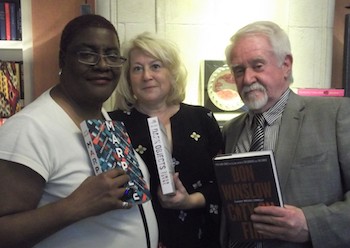
We were sorely tempted by early proofs of Marple, an anthology coming in September, which sees Agatha Christie’s famous detective starring in twelve new stories written by contemporary female crime-writers including Val McDermid, Dreda Say Mitchell, Elly Griffiths and Lucy Foley.
Half on the List?
Any self-respecting list of thriller and spy fiction authors will surely feature the name Frank Ross, or perhaps only half of it, as it was the pen-name of a double act who wrote a trio of action-packed novels, though one half of that partnership remains something of a mystery.
The Frank Ross name first appeared on Dead Runner in 1977, a thriller which was publicly praised by both Len Deighton and Alistair MacLean. The author’s biography was suitably mysterious, if not downright misleading, and claimed that the author (singular) was dedicated ‘to the pursuit of contented anonymity.’ This potted biography was repeated in 1978 with the publication of Sleeping Dogs, about the establishment of a Russian ‘sleeper cell’ in the USA in 1958 and again in 1979 in The 65th Tape, a conspiracy thriller about an attempt to take over the White House.

However, I have just acquired The Shining Day, a 1981 spy thriller set at the start of WWII, and although ostensibly by Frank Ross, the jacket blurb informs me that the name no longer referred to a partnership. The two parts of ‘Frank Ross’ had gone their separate ways although both still used Ross as a pen-name in the same year and indeed with the same publisher, Macmillan, one for an historical novel (?) Goldship and the second for The Shining Day.
As far as I can gather, this Frank Ross #2 was Norwich-born journalist Michael Ewing (1934-2007) who wrote for the Daily Mirror and the Daily Express before retiring to live on a houseboat in the south of France. He also may have used the pen-name Blair Stuart for the novel Bloodwealth and was said to be working on a novel set in Paris, of which I can find no trace - or of any other fiction after 1981.
I may have got this entirely wrong and it leaves the mystery unanswered of who was the other half of the original partnership, ‘Frank Ross #1’? A normally authoritative history of British thrillers suggests that it might have been someone called Colin Northway, but I cannot be sure and I do hate mysteries.
Holiday Noir
Lockdowns and restrictions on foreign travel have clearly inspired crime writers to work out their fantasy vacations by setting their new novels in exotic locations or luxury holiday resorts.
Over the coming months, watch out for: The Last To Disappear, set in an icy Lapland ‘Christmas village’, by Jo Spain [Quercus]; Dead Rich (yachting in the Caribbean) by G.W. Shaw [Riverrun]; The Island (Australia) by Adrian McKinty [Orion]; The Cove (Malayan beach resort) by Alice Clark-Platts [Raven]; The Bay (Australia again) by Allie Reynolds [Hodder]; A Stranger on Board (cruising on super yachts) by Cameron Ward [Penguin]; Deep Water (yachting in the Indian Ocean) by Emma Bamford [Simon & Schuster]; The Other Guest (luxury Italian resort on Lake Garda) by Helen Cooper [Hodder]; The Island of Lost Girls (Mediterranean) by Alex Marwood [Sphere]; and A Season in Exile (Mexico) by Oliver Harris [Little,Brown].
Be war ned, though, not all these holiday stories end well for those participating, actually, probably none of them. While these novels - and others coming in the summer - open windows on to new locations (travel and reading both open the mind), in the immediate future I will be turning to an established favourite in the latest case for jazz guitarist Captain Paul Darac of the Brigade Criminelle in Nice in Essence of Murder [Galileo] as written by Peter Morfoot. ned, though, not all these holiday stories end well for those participating, actually, probably none of them. While these novels - and others coming in the summer - open windows on to new locations (travel and reading both open the mind), in the immediate future I will be turning to an established favourite in the latest case for jazz guitarist Captain Paul Darac of the Brigade Criminelle in Nice in Essence of Murder [Galileo] as written by Peter Morfoot.
Sunshine, murder, fine food and wine, jazz, the South of France...what’s not to like?
Discoveries
Always on the look-out for vintage thrillers I may have missed when I edited re-issues of more than fifty as Top Notch Thrillers, I recently came across the name Robert Harling as the author of the 1955 spy thriller The Enormous Shadow.
Intrigued, I tracked down a copy on the jolly old interweb along with Harling’s Ian Fleming: A Personal Memoir, both of which I will no doubt have more to say in the future.
 
The Enormous Shadow, even before reading provided a number of surprises. Firstly, it has a genuinely informative Introduction by the late Matthew Coady, who was the crime fiction critic of The Guardian for many years and was a generous supporter of my early novels. Secondly, the edition I obtained was a 1985 paperback published by J. M. Dent (now part of the Orion group) in their “Classic Thrillers” series, an imprint I must have forgotten existed.
Judging by the other Classic Thrillers advertised in the back of the book, the series not only attracted some cracking titles, but got some famous names to write introductions to them. H.R.F. Keating introduced their edition of Eric Ambler’s Epitaph For A Spy, fellow critics Julian Symons covered Erskine Childers’ The Riddle of the Sands and T.J. Binyon introduced both Drink To Yesterday by Manning Coles and Geoffrey Household’s A Rough Shoot. It was Geoffrey Household himself who introduced Anthony Hope’s The Prisoner of Zenda.
Now that’s not a bad list of authors, critics and thrillers. Top notch in fact.
From the To Be Re-Read Pile
An age ago, when I and the world were young, I had a proper job within the British brewing industry, working for the Brewers’ Society in Portman Square, London. The Society, established in 1822, had a small library of technical books and trade journals and, I discovered, a single, lonely novel.
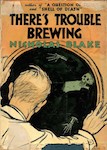
There’s Trouble Brewing by Nicholas Blake, was first published in 1937 and the edition I came across had been donated (anonymously, but I had my suspicions) to the Society’s library soon after. That copy contained several interesting annotations, written neatly in pencil throughout the text, including the words ‘rubbish,’ ‘impossible’ and, intriguingly, ‘not in Dorset!’. I read it and, as far as I remember, found myself agreeing with the comments of that anonymous, clearly irritated, annotator.
 I have to admit that I have always had a problem with the crime fiction of Nicholas Blake, who is revered for at least one classic of the genre, but I’ve read two which were real stinkers. However, I recently acquired an American paperback edition and thought I would give it another go, ignoring the fact that according to the back cover blurb the story is set in ‘the North of England’ which is the most insulting thing anyone has said about Dorset since the Tolpuddle Martyrs. I have to admit that I have always had a problem with the crime fiction of Nicholas Blake, who is revered for at least one classic of the genre, but I’ve read two which were real stinkers. However, I recently acquired an American paperback edition and thought I would give it another go, ignoring the fact that according to the back cover blurb the story is set in ‘the North of England’ which is the most insulting thing anyone has said about Dorset since the Tolpuddle Martyrs.
Bunnet’s Brewery and its obnoxious owner Eustace Bunnet dominate the Dorset town of Maiden Astbury and when his pet dog is found dead in the brewing copper, it could be a case for Nigel Strangeways, Blake’s amateur sleuth and poet, who is appearing at the local literary society. Within days, though, a human body is also found in the copper, or rather a skeleton, its flesh boiled away (I believe the procedure is known as excarnation) but it is almost certainly the hateful Eustace Bunnet. Now Strangeways swings into action, often pompously and often displaying rather unattractive traits when it comes to personal hygiene and manners when staying in someone else’s home.
The plot thickens when rumours of a take-over by a rival brewery emerge, there’s an unexpected heir to the brewery named in Bunnet’s will, an illegitimate son, a missing brother and barely-controlled sexual urges also play their part and Nigel spends at least two chapters methodical going through a complicated alibi for one of the suspects, though by now there have been two more murders.
On re-reading, I was not as disappointed as I thought I was going to be, though my misgivings (wearing my Brewers’ Society hat) still niggle. For a start, I do not think the method of disposing of the body, or at least its flesh, would actually work and the idea of a copper boiling away unattended throughout the night with false teeth, shoes and bone rattling around inside it is difficult to accept. And oddly, our hero Nigel - no stranger to a pint of beer - not once visits or even mentions Bunnet’s estate of ‘tied-house’ pubs - surely the most valuable asset to a potential take-over bidder rather than a clapped-out brewery with antiquated machinery.
It all ends with some frantic action in the brewery at night after a trail of clues which include cake crumbs, false teeth and suspects hiding in lofts and, ludicrously, disguised as a sack of malt. Though even on second reading, I’m not sure who boiled the dog and what happened to that particular batch of beer...
International Trade
 When I recommended the spy fiction of Pierre Boulle last month, I was immediately contacted by a regular reader who urged me to try some of Boulle’s short stories as collected in Because It Is Absurd, first published as Quia absurdum in France in 1970. When I recommended the spy fiction of Pierre Boulle last month, I was immediately contacted by a regular reader who urged me to try some of Boulle’s short stories as collected in Because It Is Absurd, first published as Quia absurdum in France in 1970.
Unable to find the English edition in Europe, I turned to Thrift Books in America (in Dallas, Texas I believe) who were offering a very reasonably priced ex-library copy, which I ordered on 15th March. To my delight, the copy arrived on the 28th for the paltry postage charge of only $7. {For American readers, $7 equals £5 sterling or 1 Euro.}
Could this be sign of the bright uplands of international trade we were promised for the post-Brexit era? I doubt it, but reports do tend to confirm that the book business is doing well out of this column.
One regular reader has invented a rating system for monthly Getting Away With Murder columns based on the amount spent on Kindle downloads immediately after reading. At the time of writing he had spent £10 and was only halfway through the March edition. He concluded: ‘Thanks anyway, in spite of the poverty you inflict.’
The Stark Truth
I am delighted to see that the 2018 ‘erotic thriller’ by Maxim Jakubowski, the current chairman of the Crime Writers’ Association, The Louisiana Republic, is being published in America by my good friends at Stark House Press.

I can exclusively reveal however that the leading light behind Stark House, Greg Shepherd, recently celebrated his birthday by reading an entirely different novel.

I Spy, Don’t Spy
It was a positive joy to attend a book launch in London (quite exciting really after being quarantined in the Eastern Marches for so long) and a particular pleasure to meet the charming Charlotte Philby to celebrate her novel Edith and Kim [Borough Press] which I reviewed last month.
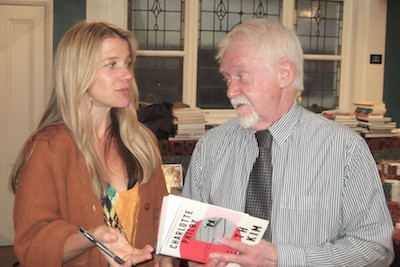
I understand that another female writer who knows a fair bit about spies and spying, Dame Stella Rimington, the former head of MI5, also had a new novel out in March.
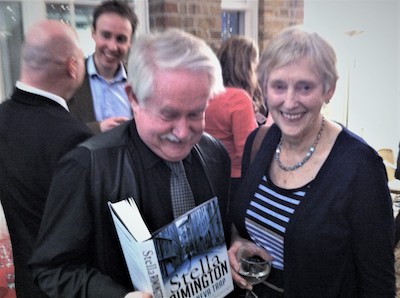
Sadly, for legal reasons, I can tell you nothing about The Devil’s Bargain other that it is by Dame Stella and it is published, it is rumoured, by Bloomsbury.
I can, however, tell you something about the new James Bond novel, With A Mind To Kill by Anthony Horowitz because those jolly nice people at Jonathan Cape have sent me an advance copy.
Horowitz’s third (and possibly last) entry into the Bond canon picks up two weeks after The Man With The Golden Gun ends, includes the funeral of ‘M’ and the action moving to Moscow and East Berlin.
And I have had a sneak preview of the forthcoming historical spy thriller The Prime Minister’s Affair by Andrew Williams, which will be published by Hodder in June.
The Prime Minister in question is Ramsey Macdonald and the setting the 1920s and ’30s and anyone who knows Andrew’s fiction (and if you are a fan of, say, Alan Furst or Robert Littell, you should) can expect his usual immaculate research coupled with a sharp eye for a plot.
 
|
|
BOOKS OF THE MONTH

Thanks to the generosity of the author rather than her publisher, I have been treated to the joyously gruesome Roman mystery [Hodder]. The gruesome bits include murder by crucifixion (a Greek practice, though they pinched it from the Persians) and the use of an over stimulated aurochs (look it up) as a murder weapon. The joyousness comes from the investigation of these deaths, which involve several trips to the undertaker, by Flavia Alba, the sharpest female private investigator to walk the mean via of Rome in AD 89.
Flavia, the adopted daughter of Marcus Didius Falco (who must surely be in danger of being made a god, if only in Colchester, by now), has her work cut out interviewing suspects in the murders of a married couple of itinerant actor-managers pitching for an appearance in one of the many theatres on the Campus Martius. Our leading lady is hindered by the fact that all the usual suspects not only have post-Saturnalia hangovers, but alibis, and chasing them involves an extensive Roman pub crawl.
Flavia needs all her streetwise savvy to untangle motive and opportunity, the means being highly inventive and based in classical drama. This was, remember, the time of gladiators and gory public executions, and actors were often expected to literally die on stage - the audiences of the Glasgow Empire had nothing on a Roman crowd baying for blood.
Despite the gruesomeness of the murders and the squalor of the surroundings, Desperate Undertakings is great fun, shot through with sharp observations on everyday life in Ancient Rome, and the author nobly restrains herself from any jokes about aurochs running amok in a Samian ware emporium, even if I could not.

Can you imagine a tougher, more mean-streeted setting for a hardboiled crime novel than the rough side of Glasgow? How about the same, but back in 1974, when honest (though not perfect) policemen like Harry McCoy had to rub shoulders with very low life and exist solely on alcohol, cigarettes and Pepto-Bismol for his entirely predictable stomach ulcer. He is also a cop who believes in justice rather than the law, often a very bloody justice with no appeal process.
In short, Harry McCoy is the brightest dark star on the Tartan Noir scene for some time and in future critics of Scottish crime fiction will surely be referring to the triumvirate of Laidlaw, Rebus and McCoy. In his fifth outing, May God Forgive [Canongate] by Alan Parks, throws McCoy into a maelstrom of murder which he has to navigate ‘old school’ without computers or mobile phones - this being back in the bad old days of 1974. A young woman is found strangled in churchyard, a shady pornographer is helped to jump off a tall building, one violent local gangster is cosying up to a scheming archbishop possibly in the hope of redemption, whilst a rival mobster wants to find his wayward son before the police do. On top of all this, a local hairdressing salon has been fire-bombed by three teenagers, killing the women and girls inside. Although quickly arrested, the trio of arsonists are dramatically sprung from police custody but this is no rescue mission, as the rescuers are vigilantes determined, very brutally, to exact an eye for an eye
May God Forgive is crime fiction which pulls no punches, powerfully told and, at time, heart-breakingly poignant, especially the scenes where McCoy comes into contact with his estranged father. One of the crime novels of 2022.

There have been many American crime novels featuring Irish criminal families, Boston being a favourite setting, where the families copy the structures and macho sensibilities of Italian mafia families, preying on the weaker elements in their local communities. The police and judiciary are bought off and they commit violent crimes with impunity, even though the rewards on offer seem pitifully small and transient. Their lives are dogged by petty jealousies and the constant fear of betrayal as no-one, not even close family members, can ever really be trusted and, of course, the need for redemption. These are familiar themes, but Don Winslow, as might be expected, gives us a new take on them through the first of a proposed trilogy, City On Fire [HarperCollins].
Set in an area of Rhode Island known locally as ‘Dogtown’ in 1986, Winslow unveils a saga of two criminal families, one Irish the other Italian, going to war in true Homeric fashion over a perceived insult involving a beautiful woman, who emerges Venus-like from the waves on the local beach. Things rapidly escalate as male egos are bruised and the body count rises. The still small voice of calm is represented by Danny Ryan, the illegitimate son of the Irish mob boss, who is thrust into the role of peacemaker whilst still trying to earn a dishonest living, struggling with a terminally ill wife and determined to make sure his estranged mother (a fascinating character) stays estranged.
Despite a large cast of mostly sad characters living in a tragic bubble of their own pathetic delusions, Winslow rarely lets the pace falter and the stakes are raised when a large shipment of heroin comes up for grabs, drawing the attention of federal law enforcement.

Although an unspoilt Greek island features heavily in Christobel Kent’s In Deep Water [Sphere], this is not an example of ‘holiday noir’ but it is certainly very noir with themes of grooming, coercive control, abuse, revenge porn and violence against women orchestrated by a serial rapist with an appallingly successful track record.
When naïve and insecure Sukie flies off for a three-day break with a much older man she has only recently met via a ‘dating site,’ her friends (and formidable mother) have reservations, but they are as nothing to the concerns of Heather, who spots the pair at the airport, recognises the man as her unpunished rapist and sets off in pursuit. As the rapist’s background, along with other very shady activities, come to light - mostly through the internet or intermittent mobile phone messaging - and the narrative flits between London and a remote Greek island once known as a rustic hippy haven, the race to save Sukie is on.
The American critic Sarah Weinman once complained that some characters in crime fiction were TSTD - Too Stupid To Die - and one is tempted to put the 27-year-old Sukie into that category, especially when her most genuine expression of despair comes when the battery on her mobile phone gives out. (A cliché to rank with a twisted ankle whilst running through a forest in the dark in modern thrillers.) But sadly we know that such grooming techniques are used by unspeakable predators and In Deep Water pulls no punches, so that the reader is genuinely fearful for Sukie’s survival.

Iceland is back on the crime atlas with a vengeance this month. In Outside by Ragnar Jónasson [Michael Joseph], four apparent friends choose for their reunion to go on a ptarmigan hunting trip in the remote highlands but on their way to the site of the shoot they get blindsided, quite literally, by a snowstorm. Taking shelter in a rescue hut, they find it occupied by a silent, possibly comatose figure sitting nursing a shotgun, but that and the inevitable loss of mobile phone signal are not the nastiest shocks in store.
Told in brief bursts by each main character in succession, you just know that five armed people stranded in an isolated, unheated hut isn’t going to end well and it’s not long before the reader suspects this might be an elaborate set-up and the crucial questions are who is being set-up and who will survive.
And it may be heresy, but one of my favourite practitioners of Icelandic noir is not himself an Icelander, but Michael Ridpath, a former City trader who switched careers to become the author of some acclaimed thrillers (ranging from the world of high finance to historic spy stories to nuclear submarine adventures) and a thoroughly satisfying crime series set in Iceland featuring Inspector Magnus Jonson. In Death in Dalvik [Yarmer], Magnus investigates a murder in Dalvik, a fishing village on Iceland’s northerly coast with a population of 1,400 according to Wikipedia (though probably fewer after this novel). The traditional world of Dalvik is experiencing a very modern pestilence in the form of craze for Bitcoins and a home-grown crypto-currency, Thomocoin, and thank goodness Michael Ridpath is one of the few crime-writers, possibly the only one, capable of explaining such things, though that they become a motive for murder doesn’t surprise me at all.

Peter Murphy’s series hero barrister Ben Schroeder does not make an appearance in his new novel To Become An Outlaw [No Exit] until well after half time, when his expertise is called upon to sort out several sensitive legal issues. It sounds churlish to say the first half does not suffer from his absence, but the establishing plot involving ex-pat South Africans in Cambridge supporting anti-apartheid movements, including the ANC, back home is fascinating enough given that the setting is the late ’60s and early ’70s and there is a clear and present danger from agents of BOSS, the ferocious Bureau of State Security.
The fairly naïve academic couple at the centre of things get involved in passing funds to campaigners in South Africa via the system of Hawala, which transfers money all over the word based on a number of trusted ‘bankers’ without the need for sacks of smuggled cash, or indeed, bankers. (It used to be called ‘Balti Banking’ by CID officers of my acquaintance). Technically, there is nothing illegal about this, unless, of course, it could be funding the purchase of illegal arms or its source was from the drug trade and it seems as if it might. When a double murder and then a further death take place, the police and MI5 start to take notice, as does a Boss ‘sleeper’ agent very close to home. If nothing else, the couple could well face a charge of money laundering, so enter Ben Schroeder...
To Become An Outlaw (a quote by Nelson Mandela) does an excellent job describing the iniquities of apartheid and the need to campaign against it, even though the British government did not, at times, want to upset the South African regime. It is difficult to come to terms with the fact that such a regime could exist in one’s own lifetime, but Peter Murphy’s legal thriller is a sombre reminder that it did.
Sad News
I was horrified to learn of the death, at a ridiculously young age, of Thalia Proctor after her battle with cancer. Thalia was well-known in the crime-writing community as a knowledgeable and well-read fan, a bookseller and an editor with Little,Brown. She even loaned her name to a character in the novel That Angel Look in 1997.
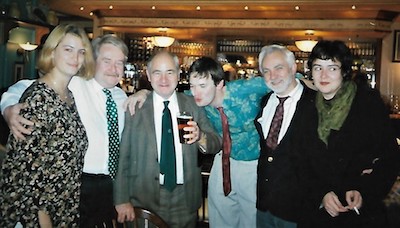
Thalia was a regular delegate at crime-writing conventions and is pictured here at one of the Nottingham Shots On The Page in the early 1990s, along with myself, Colin Dexter, Ian Rankin, Otto Penzler and Maria Rejt of Macmillan.
April also saw the death, at 92, of thriller-writer Harry Patterson, better known as Jack Higgins. A short tribute appears here on Shots and I would be interested to hear which of Higgins’ prodigious output - apart from The Eagle Has Landed - has struck a chord with readers over the seven decades in which he was published here and in the US, indeed worldwide. Do send me your nominations for a favourite Higgins c/o shotseditor@yahoo.co.uk putting ‘Higgins’ in the subject line.
For what it’s worth, my ‘non-Eagle’ vote would go to A Game For Heroes from 1970, originally published under the name James Graham.

LATE NEWS
(Held over from 1st April)
The Golden Age crime writer Evadne Childe really should need no introduction, especially to readers who have followed the career of her friend Golden Age sleuth Albert Campion. Indeed, Evadne Childe herself appeared in Mr Campion’s Séance in 2020, a book which, coincidentally contains the only known complete bibliography of Childe’s novels featuring her archaeologist detective hero Rex Troughton.
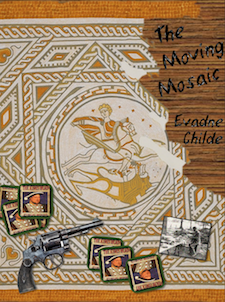
It is well-known to viewers of the Talking Pictures channel that her 1950 thriller The Moving Mosaic was filmed in 1952 but the 1972 remake for television is, strangely, more obscure. The full behind-the-scenes drama of the making of that television version is, I am reliably informed, told in the forthcoming novel Mr Campion’s Mosaic [Severn House] in October this year.
Toodles!
The Ripster.
|